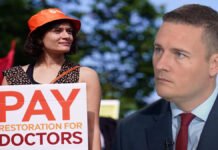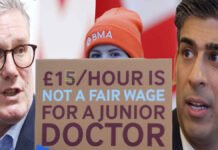Standing Up for the Backbone of Our NHS
As junior doctors resume their valiant strikes amidst the winter crisis, their fight crystallises an endless struggle to protect our treasured NHS.
It’s important to understand the gravity of the situation at hand. Junior doctors are a vital part of the healthcare system, often working long and gruelling hours in high-pressure environments to provide essential care to patients. However, despite their critical role, they are frequently undervalued and underpaid.
This is not only unjust but also unsustainable in the long run, as it risks driving talented young doctors away from the profession and exacerbating the ongoing recruitment crisis within the NHS.
The strike action being taken by junior doctors is not a decision they have taken lightly. In fact, they have already carried out several rounds of strikes in recent years in an attempt to draw attention to their plight. However, despite these efforts, little has been done to address their concerns.
These frontline medics have endured over 26% real-terms pay cuts since 2008, as capped wages lagged behind soaring inflation. Their selfless service warrants better than financial struggle.
The British Medical Association (BMA), whose members include junior doctors, says the cohort has faced a “steep decline in pay” since 2008-2009 and are seeking redress.
Health workers have already had a pay bump — but say they’re hardly flush with cash after years of constrained public sector offers of remuneration.
Unveiling annual public sector salary adjustments last summer, Prime Minister Rishi Sunak offered doctors and dentists a 6 percent pay hike. Junior doctors got a one-off £1,250 payment on top of that, while most senior NHS managers got a 5 percent uplift.
But this pales in comparison to the BMA’s demands for “full pay restoration” of 2008-2009 pay levels, stripped by years of austerity. This represents a 35% raise to account for lost purchasing power. While the government touts its latest below-inflation pay bumps as fair, they are crumbs after a decade-plus pay squeeze.
Junior doctors seek not just decent livelihoods, but retention of talent leaving in droves. Their exodus imperils the NHS; only proper pay can stem the tide. Ministers cry poverty, but this investment in stability is needed and justified.
By striking, juniors take a stand for all NHS staff battling to keep services afloat. Their fight is ours; an injury to one is an injury to all. They deserve the backing of the public they diligently serve.

Matthew Taylor of the NHS Confederation membership organization warned this week that the strike is arriving during “the most pressurized week of the year,” and that many health trusts are already skating on the “thinnest of ice” due to seasonal pressures.
“To face almost 150 hours of continuous stoppages is a serious and unprecedented risk — and one that NHS leaders and their staff have never experienced before,” he said. “The good news is that the NHS has again prepared extensively and has had to become adept at planning for strikes.”
Speaking after the last wave of strike action in December, NHS National Medical Director Stephen Powis said: “As well as having an impact on planned care, industrial action is putting pressure on wider services, and prioritizing emergency care takes staff away from other areas such as recovering services.”
The NHS is already battling to bring down mammoth treatment backlogs exacerbated by COVID, and ambulance waiting times are a long-running political sore for the governing Conservatives. In short, it’s a perfect storm.
Yet the government refuses to even negotiate amidst the strikes. Its stubbornness raises doubts over a willingness to find common ground. Compromise requires open minds, not rigid posturing.
What sustains this nation if not the health of its people and those who care for them? Restoring fair pay for doctors is a crucial step to mending our broken NHS.
Junior doctors do not strike lightly, but are left with no choice. They walk out for patients as much as themselves. It is time we walk with them. Their fight is a beacon amidst the gathering darkness – Their fight is our fight…
-Paul Knaggs
Support Independent Journalism Today
Our unwavering dedication is to provide you with unbiased news, diverse perspectives, and insightful opinions. We're on a mission to ensure that those in positions of power are held accountable for their actions, but we can't do it alone. Labour Heartlands is primarily funded by me, Paul Knaggs, and by the generous contributions of readers like you. Your donations keep us going and help us uphold the principles of independent journalism. Join us in our quest for truth, transparency, and accountability – donate today and be a part of our mission!
Like everyone else, we're facing challenges, and we need your help to stay online and continue providing crucial journalism. Every contribution, no matter how small, goes a long way in helping us thrive. By becoming one of our donors, you become a vital part of our mission to uncover the truth and uphold the values of democracy.
While we maintain our independence from political affiliations, we stand united against corruption, injustice, and the erosion of free speech, truth, and democracy. We believe in the power of accurate information in a democracy, and we consider facts non-negotiable.
Your support, no matter the amount, can make a significant impact. Together, we can make a difference and continue our journey toward a more informed and just society.
Thank you for supporting Labour Heartlands












